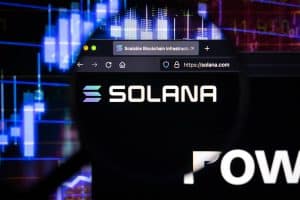MT4 vs MT5 for Crypto Trading

In Brief
Discover the differences between MT4 and MT5. How adequate are these charting platforms for crypto trading? Learn more about this topic here.

Source: Vito Goričan via Unsplash
MT4 and MT5 remain the most popular software innovations from the Cyprus-based MetaQuotes. They’ve gained prominence in forex but are adept in other traded assets like cryptocurrencies. Many have wondered if there are differences to write home about between MT4 and MT5 for crypto trading. Let’s briefly examine both charting platforms in more detail.
What is MT4?
MT4 or MetaTrader 4 is MetaQuotes’ most ubiquitous charting software, debuting in July 2005, five years before MetaTrader 5. The timing of MT4’s release was perfect, launching during a period in which the retail forex market became prominent.
MT4 combined a stripped-down, user-friendly software with the ability to create trading ‘robots’ or automated strategies. Within a few years, it slowly became the go-to forex trading platform. This is a status that MT4 has held until now, with almost all FX brokers providing the software to their clients.
Still, MetaTrader accommodates many other traded assets, including crypto, indices, commodities, and futures.
What is MT5?
MetaTrader 5 looked to build on the already successful MT4 without altering the core of what made its predecessor a usable platform. MetaQuotes released the former in June 2010 with the purpose of a multi-market charting package.
Software developers introduced support for more unique instruments than MT4, such as options, stocks, bonds, and futures. MetaQuotes also ramped up the performance and initiated new bells and whistles like several order types and technical tools.
While MetaTrader 5 is technically better, MetaTrader 4 remains more popular. Yet, the adoption of MT5 has slowly grown with each passing year.
Key Differences Between MT4 and MT5

Source: Austin Distel via Unsplash
Let’s dive deeper into the technical differences between MT4 and MT5.
Performance
Fortunately, while MT5 requires slightly more computer requirements, these are far less demanding than other modern trading software. MT4 needs a computer with:
- 32-bit Intel-based processor with at least 1.7 GHz frequency (or equivalent).
- 256MB RAM.
- Windows XP (or equivalent).
Meanwhile, MT5 requires a PC with:
- Any 64-bit Intel-based processor with at least 2.0 GHz (or equivalent).
- 512MB RAM.
- Windows 7 (or equivalent).
This performance boost for MT5 means brokers can connect to more servers in the trading terminal than MT4, resulting in lower latency.
Market Selection
The maximum number of markets MT4 can handle is 1024. Meanwhile, this figure is unlimited with MetaTrader 5.
Time Frames
MT4 contains nine time frames, namely: M1 (1 minute), M5 (5 minutes), M15 (15 minutes), M30 (30 minutes), H1 (1 hour), H4 (4 hours), D1 (daily), W1 (weekly), and MN (monthly).
On the other hand, MT5 has 12 more: M2 (two minutes), M3 (three minutes), M4 (four minutes), M6 (six minutes), M10 (10 minutes), M12 (12 minutes), M20 (20 minutes), H2 (two hours), H3 (three hours), H6 (six hours), H8 (eight hours), and H12 (12 hours).
Execution Types
MetaTrader 4 comprises three execution forms: instant execution, market execution, and request execution.
Conversely, MT5 has all three types and an extra one named exchange execution. MetaQuotes added this mode for exchange-based assets like options, stocks, and futures. Sadly, it doesn’t cover crypto exchanges or brokers.
Order Fill Policies
MT4 only has the standard ‘Fill or Kill,’ meaning that the platform will execute your order at the requested volume (if the market conditions allow and you have enough margin). Otherwise, it doesn’t fill the order at all.
On the other hand, MT5 offers two extra policies, ‘Immediate or Cancel’ and ‘Return.’
Order Types
MT4 has the following order types: buy stop, sell stop, buy limit, and sell limit. MT5 boasts all four and two more, namely the buy stop limit and sell stop limit.
Indicators
While MT4 offers 30 technical indicators, MT5 has eight more with new additions like Triple Exponential Moving Average and Variable Index Dynamic Average.
Graphical Objects
Finally, MT5 provides five more graphical objects to MT4’s 19, with new tools like arrowed lines, Fibonacci channels, and Elliott Waves.
The Downside Of MT4 and MT5
MT4 and MT5 are suitable for trading forex, a decentralized instrument traded off-exchange and often provided by individual brokers through ‘dealing desks.’ Meanwhile, crypto is an exchange-based product. The difference is that MetaTrader cannot offer an order book with real-time orders placed by buyers and sellers, volume, and market depth.

Source: Vito Goričan via Pexels
Order books in crypto trading can be valuable tools for gauging market sentiment and identifying unique opportunities. Hence, crypto traders may consider a more sophisticated charting platform connected to an actual exchange for better transparency and data visualization.
MT4 vs MT5: Which One Wins?
MT4 is a much simpler version than MT5. However, the latter strongly resembles MT4, with a few new embellishments. So, MT5 wins but by a small margin. The main downside with either MetaTrader platform is that they need to be updated, considering they’ve been around for over a decade. This is not to say that crypto traders cannot use MT4 or MT5. Both packages excel at being simple-to-use platforms to place and manage market positions, along with competent technical analysis.
Disclaimer
In line with the Trust Project guidelines, please note that the information provided on this page is not intended to be and should not be interpreted as legal, tax, investment, financial, or any other form of advice. It is important to only invest what you can afford to lose and to seek independent financial advice if you have any doubts. For further information, we suggest referring to the terms and conditions as well as the help and support pages provided by the issuer or advertiser. MetaversePost is committed to accurate, unbiased reporting, but market conditions are subject to change without notice.About The Author
Gregory, a digital nomad hailing from Poland, is not only a financial analyst but also a valuable contributor to various online magazines. With a wealth of experience in the financial industry, his insights and expertise have earned him recognition in numerous publications. Utilising his spare time effectively, Gregory is currently dedicated to writing a book about cryptocurrency and blockchain.
More articles

Gregory, a digital nomad hailing from Poland, is not only a financial analyst but also a valuable contributor to various online magazines. With a wealth of experience in the financial industry, his insights and expertise have earned him recognition in numerous publications. Utilising his spare time effectively, Gregory is currently dedicated to writing a book about cryptocurrency and blockchain.






















































